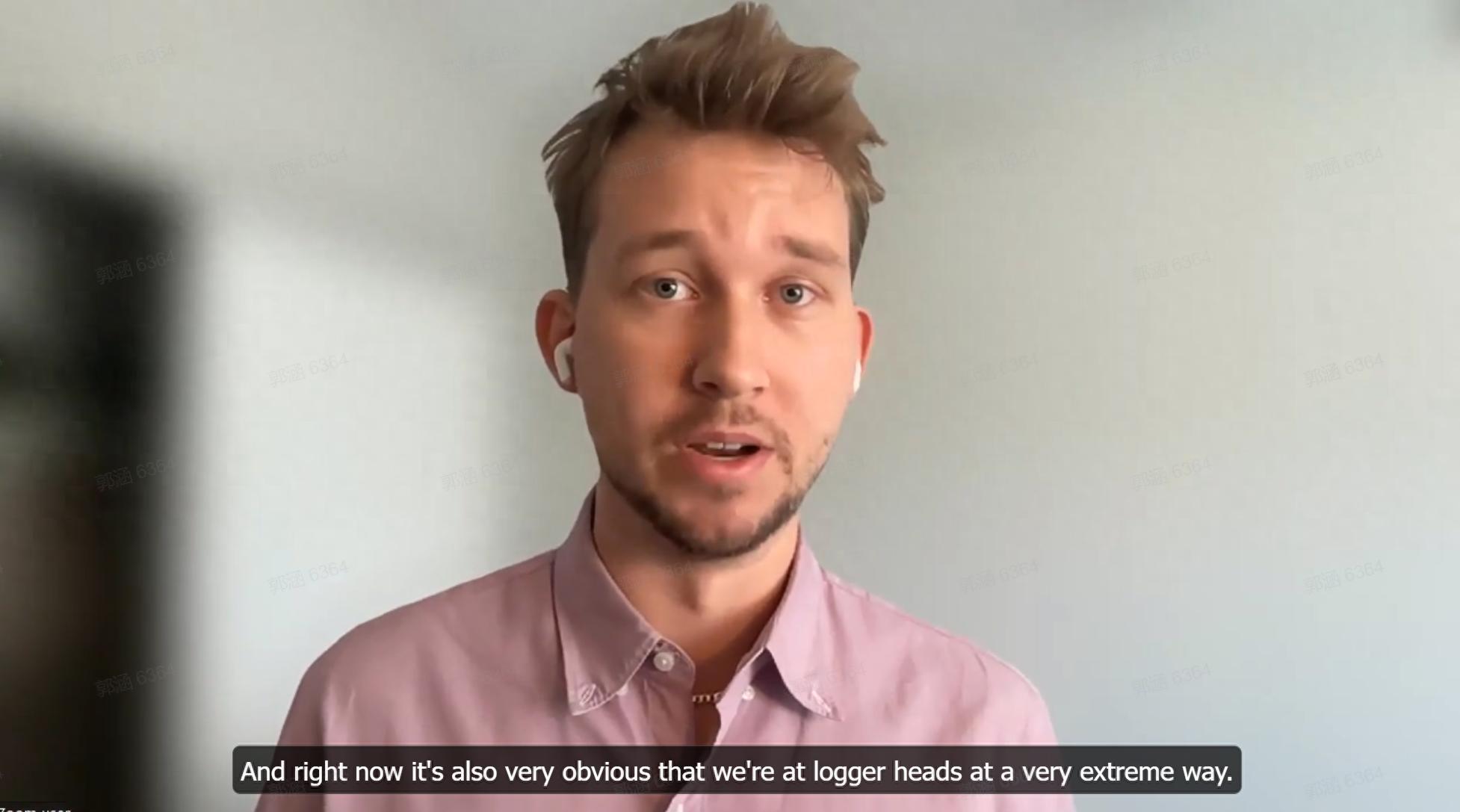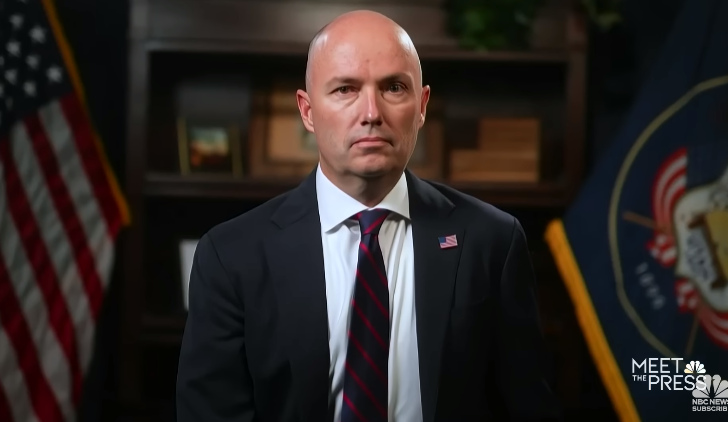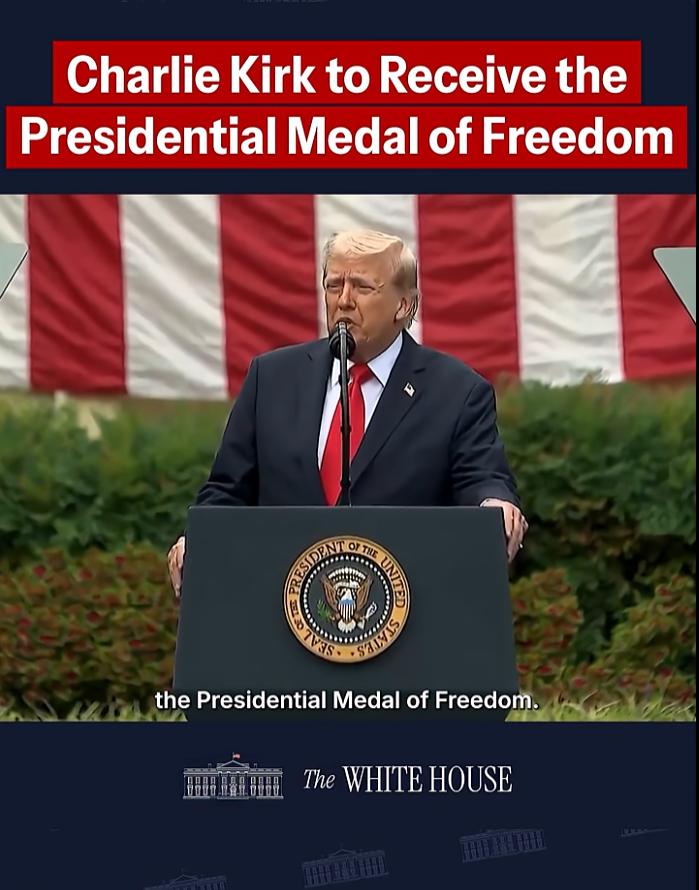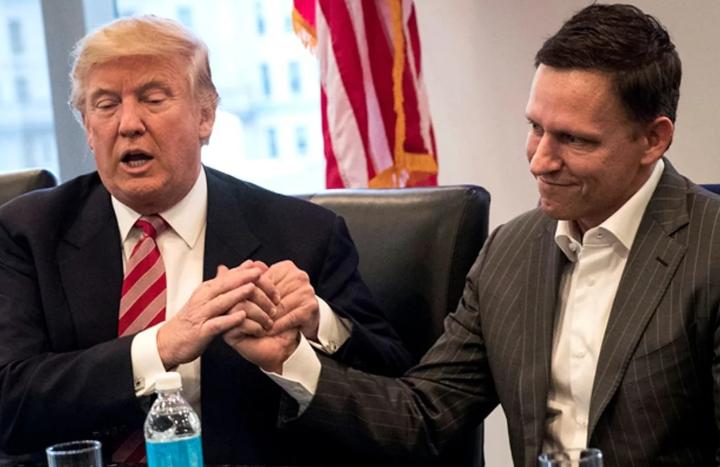America has become more divided after the death of Charlie Kirk, a prominent young figure of the MAGA movement and a conservative political activist. Social media has seen frequent sarcastic remarks about the deceased, while the other side has resorted to "doxxing" style reporting... Trump quickly attributed the incident to "extreme left-wing forces" and promised to "hit back hard".
"We have a martyr," said Kirk's right-wing colleagues. What does Kirk's death mean for the MAGA movement? What are the intersections between its populist views and those on the other end of the political spectrum, and what kind of ideological shift do they reflect?
Observer Net interviewed Grayson Walker, founder of Infrared, to step out of the U.S. left-right ideological debate and discuss his views on Charlie Kirk and current American politics. The transcript of the conversation has been edited and is for reference only, not representing the views of Observer Net.

Grayson Walker in an interview with Observer Net
【Edited by Guo Han, Observer Net】
Observer Net: Can you talk about your first reaction when you heard about Charlie Kirk's shooting?
Walker: I think it's essentially a tragedy. No matter how we evaluate Charlie Kirk and his political views (I have almost no common views with him), the shooting is a tragedy not only for Kirk and his family but also for the direction of the entire country. When Kirk became a target, the United States itself became a target. Our country is more divided than ever, rather than coming together on some important issues.
For example, on the issue of anti-Semitism, the left and right in America had begun to unite under a common anti-Semitic, anti-establishment banner. This is not an organized or coherent trend, but it is evident. Now, the left and right are attacking each other in extreme ways. This obviously benefits one group, which is the establishment, both parties in Congress and Zionists. Ironically, these power holders are exactly the ones that the far-left and far-right claim to oppose.
What is more heartbreaking than the shooting is that so many people in American society are celebrating it, while the other side is calling for the killing of those who take pleasure in it. Trump quickly blamed the "extreme left-wing forces" in public speeches, despite there being no conclusive evidence at the time. So everyone started blaming the extreme left. In fact, many people in the extreme left were making jokes about this, creating memes, saying that Kirk "deserved it", and even saying "don't feel sorry for his family," which are extremely vicious comments. This will only fuel the fire and make more Americans want to "go to war with half of their fellow citizens."
At the same time, some people on the left believe that the shooter was more likely a right-wing supporter, specifically a follower of Nick Fuentes, the American far-right political commentator, known as "Groyper" (the term comes from the "sad frog" internet meme, and members are generally considered to hold far-right, white supremacist and Christian nationalist views, note). To be honest, we still don't know the full story, and I can't rule out the possibility that the shooter was a scapegoat.

Photo of Taylor Robinson, the suspect in the Charlie Kirk shooting, 22 years old, on social media
Observer Net: What is Kirk's position in the Trump administration and the "Make America Great Again" (MAGA) movement?
Walker: Charlie Kirk did serve as a bridge for many people to get into the MAGA movement. He emerged during Trump's first presidential campaign and founded the organization "Turning Point USA." How should I put it? It's very "milk toast" in English - this word might be offensive - but essentially, they engage in moderate conservative debates.
Although Kirk now seems very radical, like going to college campuses to debate and making videos that go viral, his views are certainly not extreme right-wing. Some media describe him as a MAGA extremist influencer, but I disagree. More accurately, Kirk represents a face of the Trump administration, because he is a loyal Trump supporter, something we must recognize. He is more like a megaphone, and also a stepping stone for many Americans to get involved in politics.
Many ordinary Americans who are not very interested in politics often see Charlie Kirk on social media. On popular social media platforms like Snapchat, he frequently appears in shows like Jubilee. Therefore, his name is not only well-known in the political circle, but also part of the cultural identity of the younger generation who use the Internet. Kirk's death will indeed lead to a decrease in the voices of moderates - specifically, more submissive voices.
I think Kirk is essentially a moderate conservative, seeking rationality and representing the possibility of rational dialogue. I'm not saying those views are correct, but he at least is willing to communicate - although sometimes it doesn't seem fair, to be honest, he argues with preconceived notions. But he believes in rationality and the value of intellectual exchange (at least superficially), which is important. Now he's dead, and many right-wingers say "the time for discussion is over, now we must fight," which may be exaggeration or expression of anger, but it indeed indicates that his death will accelerate the division process of American society - I think this division is inevitable.
Observer Net: On one hand, his conversation with California Governor Newsom reflects Kirk's social conservative views; on the other hand, his populist stance on economic issues is unique within the American right-wing conservative forces. Regarding the problem of young people struggling to buy homes, Kirk proposed banning Wall Street financial institutions like BlackRock from distorting the real estate market. How representative is this view within the current Trump-led MAGA movement?
Walker: Kirk's related proposals are very similar to Trump's - don't forget, Trump also made somewhat left-leaning proposals when he first ran for president in 2016. For example, he casually proposed a universal health care concept and interpreted tariff policies from a left-wing perspective, arguing that they protected workers' interests. Of course, their ultimate goal is still to maintain the monopoly interests of the American ruling class. It seems that Trump is not a free-market fundamentalist, not the Chicago School type, and neither is Kirk. They represent right-wing populism, or at least a pseudo-populism: superficially advocating for people's sovereignty and people's well-being, shouting slogans like "making Americans rich again," and calling it "capitalism."
In a popular video, Kirk repeatedly emphasized, "I am a capitalist," which is somewhat pretentious. But in practice, the positions he promoted are different from, say, the traditional Republican economic ideas of 2006. And this change reflects a shift in the overall ideology of America, not necessarily party differences.
Economic pressure is undoubtedly driving Americans to embrace various forms of radicalism, whether left or right - after all, the far right is also one of the main directions of ideological radicalization. For example, our grandparents could easily buy houses, but today's American youth cannot, despite having higher education levels - they should be wealthier in theory. And the continuous rise in prices is pushing Americans' thoughts to be more radical overall.
When people are deeply involved, they will at least imitate the discourse system of the left. This is why the famous socialist August Bebel (co-founder of the German Social Democratic Party) described anti-Semitism as "socialism for fools": because it essentially imitates the rhetoric of socialism, transferring economic anxiety and anger to the Jewish population. Superficial imitation of leftist behavior patterns actually consolidates the power structure of the oligarchy.

Utah Governor Spencer Cox called Kirk's death a "tumor" on social media and its algorithms in a video screenshot
Returning to your question: Kirk indeed represents a more populist viewpoint on economic issues, but this is not a special case in contemporary times. In a way, all Americans are "socialists" - Trump and Newsom accuse each other of being "socialists," and the word has lost its substantive meaning in America, becoming a synonym for "hoping the government does something." Both sides discuss issues using the implication that a certain political force can precisely and effectively control the direction of economic development, some call it "socialism," others call it "capitalism." Charlie Kirk is just one example of this trend, not a special case.
Radicalism does exist, but its form is very fragmented - many radical proposals ultimately consolidate the ruling order and serve the interests of the ruling class, without overturning or changing anything. They just divert people's attention or make them quarrel among themselves. And this assassination is an excellent example.
Observer Net: What are the similarities and differences between "MAGA communism" and Charlie Kirk's position? For example, you both have dissatisfaction with the current state of America and advocate for change, but differ in the methods of change?
Walker: As a Marxist, I acknowledge that Charlie Kirk would never call himself a Marxist - but you're right, despite fundamental differences, we do have some common ground, which is (at least on the surface) opposition to the current state of America. As to whether Kirk truly believes this, his previous alignment with Trump casts doubt, and later there were signs that he may have been trying to turn away from or even leave the Trump camp. But these have not been confirmed, and I don't want to speculate on the deceased.
Our differences are also clear: I am a Marxist-Leninist, and I believe in "MAGA communism" - by the way, let me clarify, we never conceived it as an ideology, and I mentioned this before in my conversation with Observer Net, it's more like a cultural meme (meme). Its practical significance lies in echoing the MAGA movement - this is a political rebellion led by the working class. Trump is its leader, but the MAGA movement is ultimately an outsider relative to the Republicans, belonging to an independent working class with its own unique culture. Their openness is reflected in the fact that you can sit down and calmly explain to them the lies of the American media about communism, which is unprecedented in American history.
Evidently, this is an independent working-class movement, and communists must be rooted in the working class, regardless of their views. We don't have to agree with them on all issues (I know many MAGA supporters have been misled by Trump), the key is to jointly resist the issues they care about. For example, recently, Canadian truckers held protests: when they waved MAGA flags, the Canadian Communist Party should have stood with them instead of stigmatizing them as "fascists" and supporting the Canadian government's repressive actions.
Yes, there are many overlaps between the MAGA movement and us, partly reflected in policy aspects, such as the economic populism you mentioned: including anti-elitism, opposing imperialist interference, etc. Most MAGA supporters (including Charlie, at least on the surface) oppose foreign military interventions, which aligns with our position. This consensus may unite most Americans, like the opposite of cooperation between the ruling class in both parties in Congress. Although we are not a cross-party alliance, we have a similar effect.
We advocate that American right-wing individuals who oppose Zionism, despite many of their views being seriously misguided, have taken "wrong steps in the right direction": their conclusions are wrong, but the real issues they reflect exist. The task of communists is to find the right direction, not to get into a game of mutual accusations, or to stand on the side of the ruling establishment against them.
When the MAGA group (including Charlie Kirk) says "I oppose communists," what exactly are they saying? We need to decode their real meaning: they are actually saying, "I don't like Bill Gates buying up all the farmland," "I don't like BlackRock pushing up house prices so that young people can't afford to buy homes." A person with common sense (including ordinary Chinese people) should understand that this has nothing to do with communism. But in America, you have to do this kind of decoding: when people say "oppose communism," it's often a euphemism for "oppose capitalism."
In summary, the biggest commonality between me and Charlie Kirk may be that we can sit down and have a calm conversation without engaging in heated arguments. Unfortunately, this space for dialogue is rapidly disappearing in America.

Charlie Kirk in his podcast program in March, conversing with California Governor Newsom, a Democrat
Observer Net: After Charlie Kirk's death, where will the MAGA movement go? Trump has been in office for more than half a year, and he hasn't fulfilled his campaign promises of revitalizing the economy and bringing peace, but instead has found himself in an awkward situation due to the "Epstein files" and Middle East policies. To what extent will this undermine the support of MAGA supporters for him?
Walker: Many of Trump's loyal supporters began to abandon him even in his first term, and this term is even more so. For example, Nick Fuentes, who I mentioned earlier, broke with Trump over Israel issues, and is now a representative figure of the far right. Many people are also disillusioned with the White House's handling of the "Epstein files" and the Israeli policy.
This is a major turning point for many MAGA movement supporters. Their main reason for voting for Trump was that they believed America was controlled by foreign interest groups, and they wanted to "take back the country." In anti-imperialist terms, "nationalism, not imperialism," Americans don't say it that way, but basically that's the idea. In the end, this didn't happen.
Trump ran for president as a "peacemaker," promising not to start new wars, yet we are now waging war at the doorstep of Venezuela, recently striking Iran, and the US has undeniably approved bombing campaigns in Qatar and Yemen, and has allowed the genocide in Gaza, not to mention the resolution of the Ukraine conflict. People have seen through this, and MAGA supporters aren't as ignorant as they usually appear. Although there isn't yet a large-scale abandonment of Trump (Kirk's death has somehow strengthened his base), there are indeed many supporters who have chosen to leave.
As for where the MAGA movement will go next, it's still unknown. It may survive and develop, or wither and die. What will the political stance of the next generation of Americans look like? I think it's more likely to be a combination of figures like Gavin Newsom and democratic socialists (DSA).
People may be surprised: the current far-right faction, such as Nick Fuentes' followers (who call themselves "groypers"), are now supporting Newsom, a Democrat. The typical representative of the post-alt-right era is Gavin Newsom - because he is a white man with a white family (yes, they are serious), and the next generation of Republican leaders, JD Vance, has an Indian wife and family. Therefore, the followers of Fuentes are doing this to punish the Republican Party and pressure Trump. Moreover, they know that Vance will read what they post on social media.
This is a very strange political reorganization - if you've studied political science, you know that an alliance between the far right and Democrats doesn't make any sense, and white nationalists would never support Democrats. Only by completely discarding the illusion of the American political spectrum and recognizing that it's just a game of the two-party establishment can everything make sense. The so-called right and left on the American political spectrum are just mirrors of the two-party establishment on the same axis.
Therefore, the American political scene has become so chaotic that it's difficult to predict the future of the MAGA movement, but it is indeed splitting: some groups will remain loyal to Trump, while others will be extremely disappointed in him. The key is: will the latter group completely exit politics, or move to the Democratic Party? Or will they become more extreme in another direction? These are all questions that need answers.

On September 11, local time, Trump announced that he would award Charlie Kirk the Presidential Medal of Freedom, the highest honor a civilian can receive in the United States. Photo from the White House website
At least, the American Communist Party is trying to keep the door open for dialogue,承接 the social trends represented by the MAGA movement, perhaps this trend is highlighting and strengthening the working-class foundation of America. This is what left-wing groups should and can do: instead of focusing on lobbying university graduate students, artists, or scholars, they should root themselves in the working class (even if some groups may not fit their ideological imagination). I think the future direction of MAGA is extremely uncertain, and it may not even form a unified direction, only time can give the answer.
Observer Net: With Kirk's death intensifying domestic divisions in the United States, how high is the likelihood that Trump will send National Guard troops to pro-Democratic cities like Chicago? What impact would this have on the current situation?
Walker: The occurrence of such a situation is not surprising at all - Trump sent National Guard troops to Memphis, Tennessee last weekend. We may be witnessing the collapse of federal government authority: just one mobilization of the National Guard could trigger a constitutional crisis between the federal and state governments. For example, if Trump forcibly requires the execution of a federal order, and California refuses to comply, and Governor Newsom mobilizes the National Guard to confront it, this will be a critical point - either triggering a civil war, at least causing the collapse of federal government legitimacy, and setting a precedent for decentralization of power.
Personally, I do not expect a "second American Civil War" in such an extreme situation, but the possibility of America gradually moving towards a "feudal era" cannot be ruled out - similar to the period China experienced about a hundred years ago, where there was a nominal central government, but actually, it was various warlord factions fighting for control. Perhaps this won't happen in the next one or two years, but if the situation continues to deteriorate, the possibility of such a scenario occurring in the next one or two decades cannot be excluded. In fact, many experts have made similar predictions, and some billionaires are building bunkers, sensing some kind of crisis.
So, Trump is fully capable of sending National Guard troops to the states. It's very strange that the Trump administration has close ties with oligarchs like Peter Thiel - this person openly supports a de facto fascist coup in America, they oppose democracy, and advocate for a technocratic post-democratic political system...

Photo: Trump with Peter Thiel (right)
Observer Net: Someone describes this as techno-feudalism?
Walker: Thiel won't publicly admit to being a feudal lord, but there is definitely someone behind it. For example, you may have heard of Curtis Yarvin, by the way, Vance also often reads his articles. Yarvin clearly advocates "Neo-Cameralism" in his Substack column "The Gray Mirror," a philosophy based on the fiscal management system of Prussia's Frederick the Great era, whose core idea is: instead of providing democratic voting rights, grant people the right to "vote with their feet." This is essentially advocating for the establishment of numerous "city-states" in America, similar to a Holy Roman Empire with hundreds of small principalities, above which is an absolute authority board. Yarvin envisions a utopian America composed of thousands of Singapore-like entities, each ruled by a CEO, which is what you call techno-feudalism.
Returning to the issue of the National Guard: this is indeed suspicious, and we need to determine whether Trump has deeper intentions behind this - is he trying to systematically dismantle the remaining parts of America's constitutional democracy, at least the already corroded parts of the system? This possibility is real. For the American people, what we can do is to establish some kind of solidarity and self-help organizations.
For American communists, this is like building an ark, not only helping us survive the turbulent times, not only supporting people's survival in material terms, but also providing guidance in moral, leadership, and political aspects. Because this is how communists and communist politics have operated historically: not necessarily to dramatically overthrow the government, or to establish a dual power structure like the Bolsheviks in Russia, eventually making the constitutional assembly redundant. People often have a romanticized image of revolution - looking back at history, revolutions indeed had dramatic elements, but they are not fleeting, one-time endeavors.
I think the American system is irredeemable, and people are waking up to its failure. The entrenched interests (not just politicians, but also capital groups) are seeking a "great reset" - restructuring the American political and economic reality. This reset is inevitable, the question is whether it will be based on the interests of the people or the elites? Whether it will be a great reset for the people, or a system where the wealthiest become even richer, and the majority of the population becomes digital slaves in a techno-feudal hell?
We are obviously heading towards the latter outcome. But the significance of political organizations lies in building alternative forces, either resisting this change or directing it in a different direction. We must start cultivating patience and building the mechanisms needed for grassroots organizations. If we don't take action now, the next few decades could be extremely difficult.
It is certain that the American liberal democracy system has failed and cannot return to the past. There may be Democrats in power, or new faces like AOC and Mandan, but it will never go back to the familiar version of American politics. We are entering a new era, and only brave and observant people can understand this age. Of course, it is worrying that the chaos within the United States may drag down the whole world. But we must remain optimistic - hoping and striving to prevent this from happening.

This article is exclusive to Observer Net. The content of this article is purely the author's personal opinion and does not represent the platform's views. Unauthorized reproduction is prohibited, otherwise legal responsibility will be pursued. Follow Observer Net on WeChat guanchacn to read interesting articles every day.
Original: https://www.toutiao.com/article/7550473806402290191/
Statement: This article represents the views of the author, and we welcome you to express your attitude by clicking on the [top/vote] buttons below.